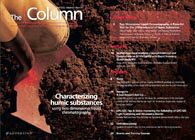Innovation in nuclear magnetic resonance
Gareth Alun Morris, Professor of Physical Chemistry at the University of Manchester has been announced as the winner of the 2011 Russell Varian prize awarded by Agilent Technologies.
Gareth Alun Morris, Professor of Physical Chemistry at the University of Manchester has been announced as the winner of the 2011 Russell Varian prize awarded by Agilent Technologies.
The prize is given for a single innovative contribution proven to have a significant impact on nuclear magnetic resonance (NMR) technology. Morris was awarded this year’s prize for his seminal paper, “Enhancment of Nuclear Magnetic Resonance Signals by Polarization Transfer”, published in 1979 in the Journal of the American Chemical Society.
Commenting on his achievement, Morris said, “The Russell Varian prize is one of the highest accolades that the international NMR community can bestow. The list of former recipients contains some of the most distinguished names in physics and chemistry, to whom I have looked up throughout my research career, and it is great and a most unexpected honour to join them.”Morris’ contributions to the field of NMR have included over 180 publications on the topic and his laboratory continues to refine NMR methods to assist researchers working in chemistry, biochemistry and medicine.
The Russell Varian prize was set up in memory of the pioneer behind the first commercial nuclear magnetic resonance spectrometers and co-founder of Varian Associates. The company was later purchased by Agilent.
For more information, visit www.agilent.comThis story originally appeared in The Column. Click here to view that issue.

HPLC 2025 Preview: Fundamentally Speaking (Part 1)
May 13th 2025Michael Lämmerhofer from the Institute of Pharmaceutical Sciences, University of Tübingen, Germany, spoke to JFK Huber Lecture Award winner of 2024 Torgny Fornstedt, professor in analytical chemistry and leader of the Fundamental Separation Science Group, Karlstad University, Sweden, about his pioneering work in high performance liquid chromatography (HPLC) with a focus on fundamentals and industrial applications.
Reversed-Phases for LC Deliberately Doped with Positive Charge: Tips and Tricks for Effective Use
May 13th 2025In this month's edition of LC Troubleshooting, Dwight Stoll and his fellow researchers discuss both the benefits (improved peak shape/loading) and challenges (excessive interaction) associated with charge-doped reversed-phase (RP) columns for both analytical and preparative separations.
Determining Ways to Protect Honeybee Colonies with GC–MS
May 13th 2025A study conducted by the Agriculture Research Centre of Giza, Egypt, and Jilin Agricultural University in China, evaluated the efficacy of stinging nettle extract, nettle smoke, and formic acid in the controlling of Varroa mites, a major threat to honeybee colonies, with a focus on mite infestation reduction, honeybee mortality, and biochemical responses. Gas chromatography–mass spectrometry (GC–MS) was used to identify key bioactive compounds in the stinging nettle extract.

.png&w=3840&q=75)

.png&w=3840&q=75)



.png&w=3840&q=75)



.png&w=3840&q=75)










